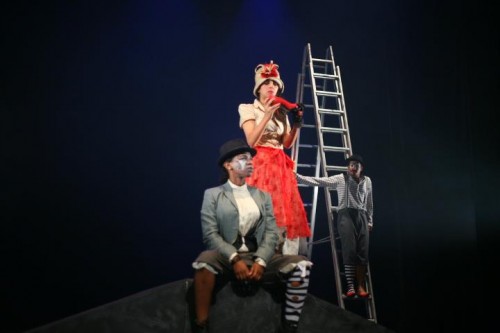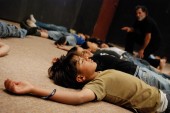The Stage is My Gun: The Cultural Intifada of Juliano Mer-Khamis
by Olivia Stransky / January 7, 2012 / 3 Comments

After Juliano’s death, students worked with a Palestinian comedian to adapt an absurdist classic into a meditation on Juliano’s death. Photo: Courtesy of The Freedom Theatre
New York, October 2011: Juliano’s Successors
In October I was given the opportunity to interview four of Juliano’s former students, all of whom had been with him on the morning of his death. They had come to the US to perform an adaptation of Waiting for Godot entitled While Waiting. After Juliano’s death Udi Aloni, an Israeli filmmaker and advocate for Israeli-Palestinian coexistence, stepped in to direct the third-year production. Through help from the Friends of the Freedom Theatre group in New York City, some of the students, now graduated, had been able to take their production out of Palestine and share the theater’s work with the world.
- Freedom Theatre Productions
- 2009: Animal Farm
- 2009: Fragments of Palestine
- 2010: Men in the Sun
- 2011: Alice in Wonderland
- 2011: Sho Kman
- 2011: While Waiting
Four of the students met with me in the apartment of Erin Mee, a theater professor and friend of Juliano who herself was writing a piece on the future of the Freedom Theater without its founder. There was twenty-two year-old Batoul Taleb who, as the eponymous character in Alice in Wonderland had been the first woman to dance with a man onstage in Jenin. She and twenty-three year old Eyad Hourani, who had played the Mad Hatter, were the most vocal of the four. Moe’men Switat, twenty-two, spoke less, but when he did it was with an unshakable certainty. Also present was Miariam Abu Khaled, a young woman who played one of the main characters of While Waiting in a departure from traditional casting.
Originally, I wanted to get a sense of who Juliano really was from these men and women. While waiting for the actors to arrive, Erin Mee gave me an idea of what I should expect. “When you see these guys you’ll see that they’re working a lot of stuff out. They were traumatized by Juliano’s death. He was a mentor, a father-figure. He was also a friend, a colleague, a drinking buddy.” I was nervous before Erin told me this, but this heightened my anxiety. I was expecting a group of fragile, quiet people doing the best they could to keep Juliano’s dream afloat.
When the actors arrived, the tone of the room immediately changed. Standing in front of me were four vibrant, tough individuals who were not going to be intimidated by any question a journalist could ask them. I told them that I wanted to do a profile on Juliano, one that would go deeper than a recitation of the publicly-known facts of his life. I said that I wanted to hear their stories about him.
The response I got was an emphatic “no.” Batoul explained the reasoning behind the troupe’s decision: “The problem is people keep asking for the same stories, and we’re not going to immediately cry for them and say ‘Yeah, I’ve been beaten, Juliano was murdered, everything is so horrible’ and cry and be pitiable.”
I was horrified on two levels. Firstly, I had never had an interviewee completely refuse to talk about the topic I wanted to discuss with them. Secondly, I felt ashamed that I appeared to be yet another in a long line of journalists harvesting personal stories from these people. The four actors asked that they be able to talk about the future, not the past. I had no choice but to agree, and the conversation that we had was more enlightening about Juliano’s legacy than what would have resulted from sticking to the questions I had arrived with.
Following Juliano’s death Batoul, Eyad, Moe’men, and Mariam left Jenin for Ramallah, the de facto capital of Palestine. There they began working on While Waiting, an adaptation that, in part, deals with Juliano’s murder. During this time they decided that they were going to found their own theater company and came to the United States, partly to raise support.
“I don’t want to bring ideas from the rest of the world to help Palestinians. Just give them tools. They already have ideas.” – Juliano Mer-Khamis
One of the biggest obstacles they faced was a consistent misinterpretation of Juliano’s work. Moe’men was emphatic about clarifying what Juliano was doing in Jenin. “His goal was not to establish a children’s theater, which is the impression you get from newspapers here. He was creating resistance through the arts by presenting quality Palestinian theater. He said once ‘I don’t want to bring ideas from the rest of the world to help Palestinians. Just give them tools. They already have ideas.’”
It’s true that many of the articles that have been published since Juliano’s death refer to The Freedom Theatre as a children’s theater. “Juliano would cry if he saw how his work was described,” Moe’men finished.
“People think of us as children, but we are not children, not anymore,” said Eyad Hourani, whose gender-queer, sexualized depiction of the Mad Hatter in Alice provoked ire and hatred from conservative elements in Palestine.
Stephanie Gilman, a former New York Theatre Workshop instructor, who taught movement classes at The Freedom Theatre, reinforced, from an instructor’s point of view, what Eyad said. “Teaching in Jenin was not that different from teaching anywhere else. Inside the studio it was an acting class for young adults. Of course we would talk about their lives sometimes, and some of these students had held guns, been in militant groups. I couldn’t ignore the trauma, but I definitely didn’t pity the students. They were talented individuals who wanted to be artists, just like at any acting school.”
Another obstacle faced by the graduates is the pressure to stay with The Freedom Theatre. There is a fixation on Juliano’s past, on what he completed before he died. While some people would consider his death an end to his work, his students continue onwards. “When we decided to study theater, our friends and family asked us ‘And after that where are you going to work?’ We didn’t have an answer,” Moe’men said,
Unfortunately, according to Eyad, “People don’t understand and they get angry at us for leaving Jenin and The Freedom Theatre. But The Freedom Theatre graduates, where will they go? Right now there’s nowhere. We have to be responsible for them.”
Continue reading this article on page 4






3 Comments on "The Stage is My Gun: The Cultural Intifada of Juliano Mer-Khamis"
Julaino Mer Khamis dedicated his life to truthful expression so I am so sorry that this article about his life and death has been turned into another anti-Israel propaganda piece. It does not even include the fact that he was in fact killed by Palestinian gun man.
Juliano Mer Khamis is a name that I hope will not be forgotten, his work must go on.
We are a gaggle of volunteers and starting a new scheme in our community.
Your website provided us with useful info to work on. You have performed a formidable process and our whole community might be thankful to
you.